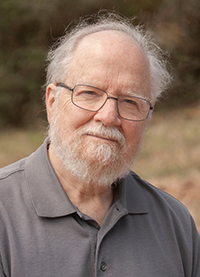 Dr. James Truman was born in Akron, Ohio, in 1945. He was drawn to biology from his earliest years and became an avid insect collector. He attended the University of Notre Dame, where he worked in the mosquito genetics lab of Professor George Craig Jr. from late in his freshman year through the summer after his graduation in 1967. His first published article was in the Annals of the ESA while he was an undergraduate. He did his graduate studies at Harvard University in insect behavior and endocrinology with Professor Lynn Riddiford and received his Ph.D. in 1970. He continued as a Junior Fellow of the Harvard Society of Fellows until 1973, when he joined the faculty of the Zoology Department of the University of Washington. He was promoted to professor of zoology in 1978 and remained there until retirement in 2007 to become a group leader at the new Janelia Research Campus of the Howard Hughes Medical Institute (HHMI) in Northern Virginia. After nine years in Virginia, he retired from HHMI and returned to the University of Washington, where, as professor of biology emeritus, he is continuing research at university's Friday Harbor Laboratories on San Juan Island in Puget Sound.
Dr. James Truman was born in Akron, Ohio, in 1945. He was drawn to biology from his earliest years and became an avid insect collector. He attended the University of Notre Dame, where he worked in the mosquito genetics lab of Professor George Craig Jr. from late in his freshman year through the summer after his graduation in 1967. His first published article was in the Annals of the ESA while he was an undergraduate. He did his graduate studies at Harvard University in insect behavior and endocrinology with Professor Lynn Riddiford and received his Ph.D. in 1970. He continued as a Junior Fellow of the Harvard Society of Fellows until 1973, when he joined the faculty of the Zoology Department of the University of Washington. He was promoted to professor of zoology in 1978 and remained there until retirement in 2007 to become a group leader at the new Janelia Research Campus of the Howard Hughes Medical Institute (HHMI) in Northern Virginia. After nine years in Virginia, he retired from HHMI and returned to the University of Washington, where, as professor of biology emeritus, he is continuing research at university's Friday Harbor Laboratories on San Juan Island in Puget Sound.
Truman's abiding interests have been in understanding how hormones control the development and functioning of the insect nervous system. His thesis work was on the hormonal control of adult eclosion in giant silkmoths and led to the eventual isolation and sequencing of the eclosion hormone—the first member of a peptide network that orchestrates ecdysis behavior. A fascination with the nervous system and metamorphosis led him into studies of the involvement of ecdysone and juvenile hormone in neurogenesis, cell death, and neuronal remodeling. His early work was on Saturniid and Sphingid moths, but later shifted to Drosophila to exploit its molecular genetic tools. These Drosophila studies resulted in new insights of how the developmental organization of the nervous system provides the modules for both its function and evolution. He is now expanding his evolutionary quest through various insect groups and into the Crustacea.
Over the years, Truman was fortunate to attract a group of more than 50 talented graduate and postgraduate students who have been instrumental in these studies. He and Lynn Riddiford were married in 1970, which also provided a mutually stimulating environment as they have directed independent, but overlapping, research programs for over 50 years. He has published over 300 research articles, reviews, and book chapters. He is an honorary member of The Royal Entomological Society, London, and a Fellow of the American Academy of Arts & Sciences. He has received the AAAS Newcomb Cleveland Research Prize and the Wigglesworth Award of the Royal Entomological Society.
Besides their enthusiasm for teaching and research, Truman and Riddiford have a strong love for cats and horses. They are avid travelers and have done research on five continents. Their abiding fascination is with Africa, where they have visited over two dozen times and have worked at ICIPE in Kenya.
(updated September 2020)
